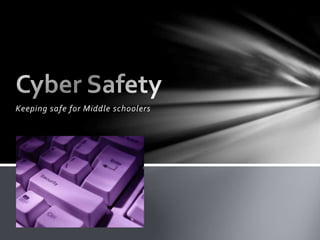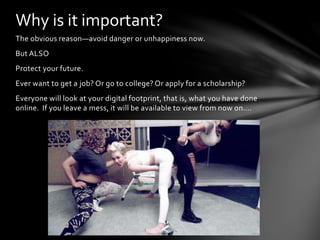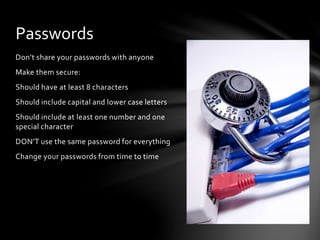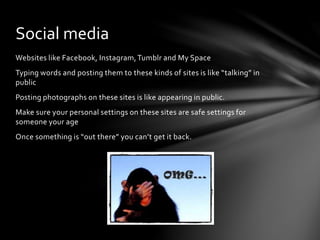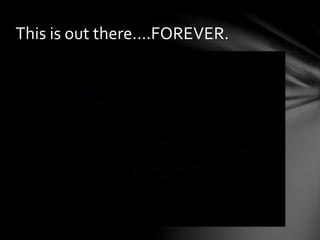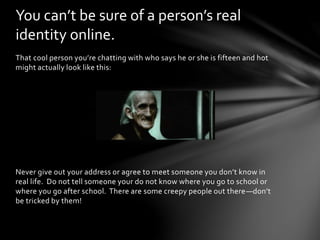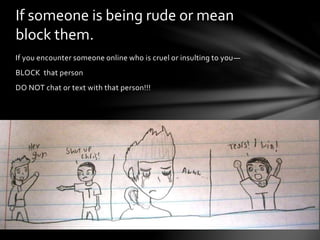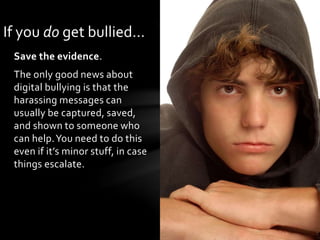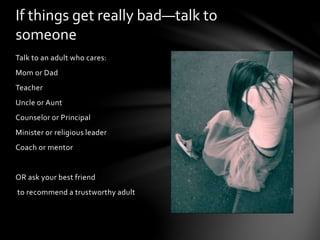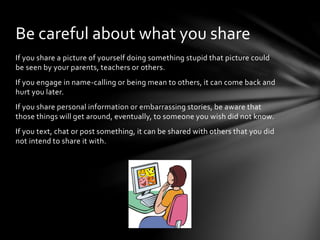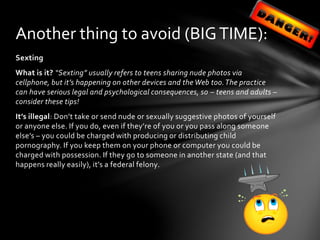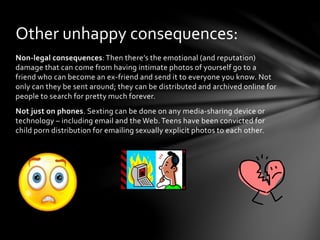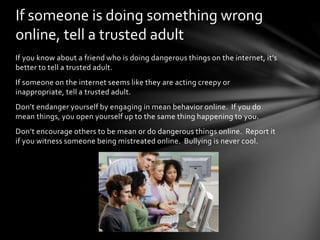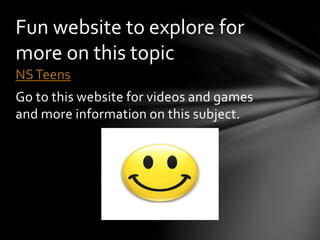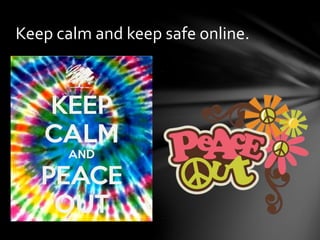Cyber safety: internet safety presentation for middle school students
- 1. Keeping safe for Middle schoolers
- 2. The obvious reasonŌĆöavoid danger or unhappiness now. But ALSO Protect your future. Ever want to get a job? Or go to college? Or apply for a scholarship? Everyone will look at your digital footprint, that is, what you have done online. If you leave a mess, it will be available to view from now onŌĆ”. Why is it important?
- 3. DonŌĆÖt share your passwords with anyone Make them secure: Should have at least 8 characters Should include capital and lower case letters Should include at least one number and one special character DONŌĆÖT use the same password for everything Change your passwords from time to time Passwords
- 4. Websites like Facebook, Instagram,Tumblr and My Space Typing words and posting them to these kinds of sites is like ŌĆ£talkingŌĆØ in public Posting photographs on these sites is like appearing in public. Make sure your personal settings on these sites are safe settings for someone your age Once something is ŌĆ£out thereŌĆØ you canŌĆÖt get it back. Social media
- 5. This is out │┘│¾▒░∙▒ŌĆ”.╣¾░┐ĖķĘĪ│šĘĪĖķ.
- 6. That cool person youŌĆÖre chatting with who says he or she is fifteen and hot might actually look like this: Never give out your address or agree to meet someone you donŌĆÖt know in real life. Do not tell someone your do not know where you go to school or where you go after school. There are some creepy people out thereŌĆödonŌĆÖt be tricked by them! You canŌĆÖt be sure of a personŌĆÖs real identity online.
- 7. If you encounter someone online who is cruel or insulting to youŌĆö BLOCK that person DO NOT chat or text with that person!!! If someone is being rude or mean block them.
- 8. Save the evidence. The only good news about digital bullying is that the harassing messages can usually be captured, saved, and shown to someone who can help.You need to do this even if itŌĆÖs minor stuff, in case things escalate. If you do get bulliedŌĆ”
- 9. Talk to an adult who cares: Mom or Dad Teacher Uncle or Aunt Counselor or Principal Minister or religious leader Coach or mentor OR ask your best friend to recommend a trustworthy adult If things get really badŌĆötalk to someone
- 10. If you share a picture of yourself doing something stupid that picture could be seen by your parents, teachers or others. If you engage in name-calling or being mean to others, it can come back and hurt you later. If you share personal information or embarrassing stories, be aware that those things will get around, eventually, to someone you wish did not know. If you text, chat or post something, it can be shared with others that you did not intend to share it with. Be careful about what you share
- 11. The person who posted this picture can never get it off the internet.
- 12. Sexting What is it? ŌĆ£SextingŌĆØ usually refers to teens sharing nude photos via cellphone, but itŌĆÖs happening on other devices and the Web too.The practice can have serious legal and psychological consequences, so ŌĆō teens and adults ŌĆō consider these tips! ItŌĆÖs illegal: DonŌĆÖt take or send nude or sexually suggestive photos of yourself or anyone else. If you do, even if theyŌĆÖre of you or you pass along someone elseŌĆÖs ŌĆō you could be charged with producing or distributing child pornography. If you keep them on your phone or computer you could be charged with possession. If they go to someone in another state (and that happens really easily), itŌĆÖs a federal felony. Another thing to avoid (BIGTIME):
- 13. Non-legal consequences:Then thereŌĆÖs the emotional (and reputation) damage that can come from having intimate photos of yourself go to a friend who can become an ex-friend and send it to everyone you know. Not only can they be sent around; they can be distributed and archived online for people to search for pretty much forever. Not just on phones. Sexting can be done on any media-sharing device or technology ŌĆō including email and the Web. Teens have been convicted for child porn distribution for emailing sexually explicit photos to each other. Other unhappy consequences:
- 14. If you know about a friend who is doing dangerous things on the internet, itŌĆÖs better to tell a trusted adult. If someone on the internet seems like they are acting creepy or inappropriate, tell a trusted adult. DonŌĆÖt endanger yourself by engaging in mean behavior online. If you do mean things, you open yourself up to the same thing happening to you. DonŌĆÖt encourage others to be mean or do dangerous things online. Report it if you witness someone being mistreated online. Bullying is never cool. If someone is doing something wrong online, tell a trusted adult
- 15. NSTeens Go to this website for videos and games and more information on this subject. Fun website to explore for more on this topic
- 16. Keep calm and keep safe online.

